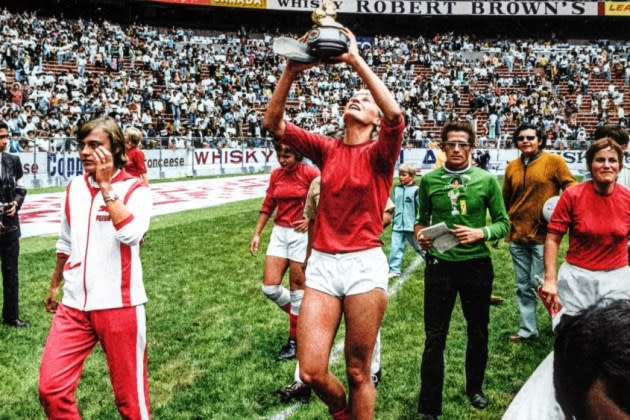‘Copa 71’ Review: Soccer Doc Sheds Light on a Women’s World Cup That Took Place Two Decades Before Many Realize

For nearly half a century, being right felt wrong to Carol Wilson. A member of the British soccer squad that participated in the Women’s World Cup in Mexico in 1971, Wilson uses the doc “Copa 71” to describe how she “remembered thinking I’m never going to see anything like this again.” In James Erskine and Rachel Ramsay’s brisk and rousing history of the tournament, few can say that they’ve even seen it when footage of the event was buried in archives for years, all but erased from collective memory. Why? The doc suggests the reasons were rooted in both misogyny and economics, seeing as how the Federation Int’l Football Association disapproved of the games as a rare major soccer event they had no control over — at least, not until starting their own women’s tournament in 1991.
What’s more fascinating than why the event isn’t more well-known by the public is why the women that played in it have rarely spoken about it. Instead, after returning to their home countries, they were made to feel shame about their participation by those who hadn’t witnessed the games themselves and mocked them for playing a predominantly male sport. With a relentless pace and plenty of kick, “Copa 71” makes it easy to get swept up in the excitement they felt when they made it to Mexico, where they saw international teams comprised entirely of women like themselves for the first time. As subjects share vivid memories of taking the field, their stories appear to stir back up the attitudes that made them great competitors.
More from Variety
For every memory, there is an image, thanks to how the tournament came about: With a massive promotional machine already in place from the previous year, organizers in Mexico believed a women’s World Cup could keep the money rolling in after hosting the men’s event the year before. Fans were plentiful, as were cameras to capture the action and the lead-up to the games. While FIFA had hoped to kill the event in the cradle by threatening venues that had previously hosted the male games, “Copa 71” shows how that plan spectacularly backfired when the country’s biggest arenas — 110,000-seat Azteca Stadium in Mexico City, and the 56,000-seat Jalisco Stadium in Guadalajara — were left available and eventually filled to capacity, still holding the record to this day for the largest draw a women’s sporting event has ever had for its finale.
Although co-editors Arturo Calvete and Mark Roberts dutifully structure the film around the tournament unfolding, doing an admirable job of making the game footage exciting, there’s a keen awareness that who wins at the end is not the primary intrigue. Despite arguments over some questionable officiating on the field, the rival players are complimentary of one another in a larger narrative of what the women were up against. Erskine, Ramsay and co-writer and producer Victoria Gregory make all the right calls when it comes to what story to tell with each national team. For instance, Denmark had to call on friends and family for financial support to make the trip to Guadalajara, and Mexico’s team staged a holdout before the final in order to be compensated fairly for playing in the tournament.
The film also makes savvy use of its sound mix when even during interviews. The roar of the crowd never feels too far away, laid in subtly throughout as if it’s just waiting to be awakened when it’s not adding momentum. Packed with plenty of personalities already, the big-name attractions of Brandi Chastain and Alex Morgan, an executive producer on the film, may feel as if they’re adding more promotional value than substantive purpose in showing up for the film’s bookend sequences, but “Copa 71” connects an entire lineage of the sport and reveals that while its popularity has been recognized more recently, it might be even greater if more of it was on the record.
Best of Variety
Sign up for Variety’s Newsletter. For the latest news, follow us on Facebook, Twitter, and Instagram.

 Yahoo Lifestyle
Yahoo Lifestyle 